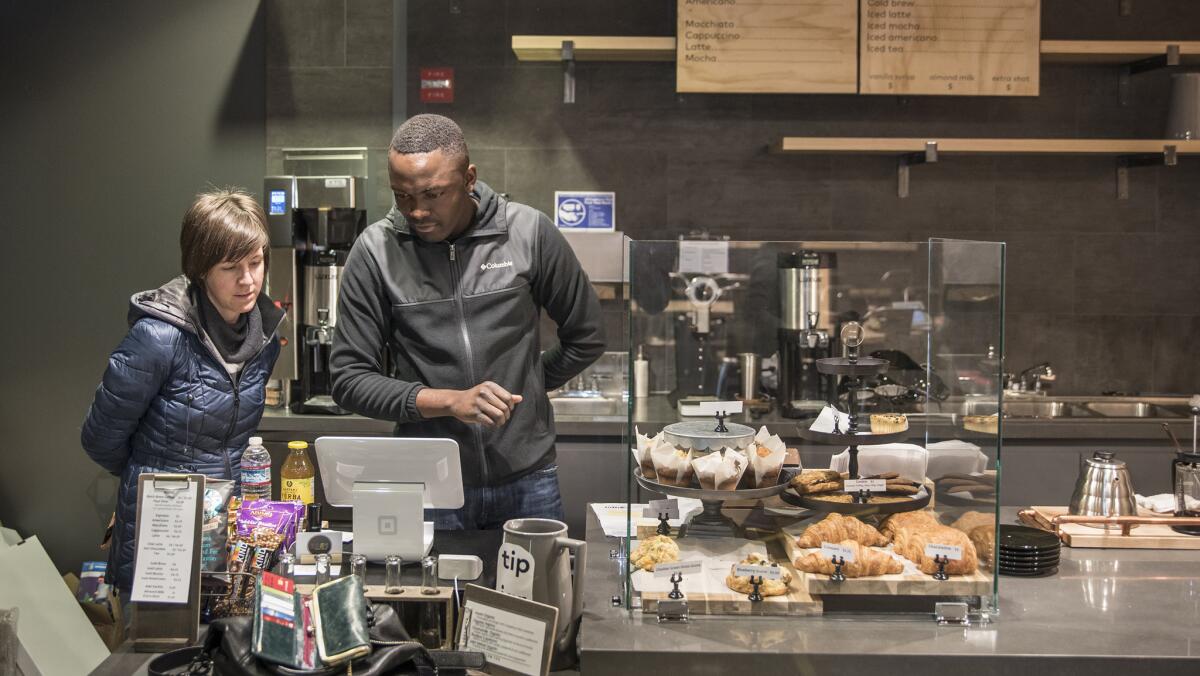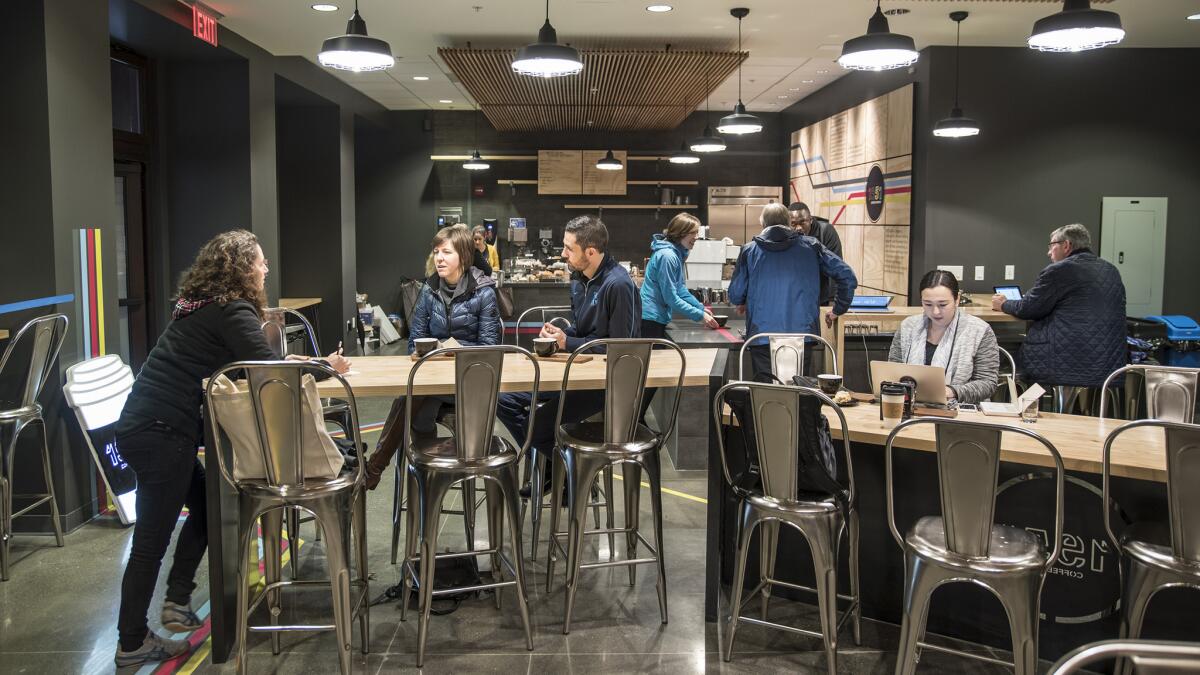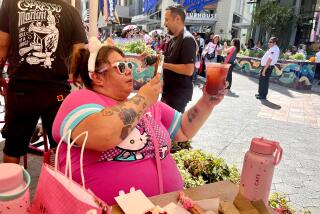Refugees get jobs — and a taste of American culture — at Berkeley coffee shop

- Share via
Reporting from Berkeley — A social icebreaker was perhaps the first giveaway that 1951 Coffee, a new coffee shop in Berkeley, is not your typical latte stop.
“Where are you from?” Nazira Babori, 26, a barista-in-training, asked her coworker, Tedros Abraha.
For the record:
4:01 a.m. Jan. 24, 2025An earlier version of this article contained a quote from barista trainee Tedros Abraha stating that the Eritrea was “above Egypt.” Eritrea is south of Egypt.
“Eritrea,” Abraha, 31, said. “Do you know Eritrea…?”
“Hmmm,” Babori said. “Is it democratic?”
With the exception of co-founders Rachel Taber and Douglas Hewitt, 1951 Coffee is entirely staffed by refugees, asylum seekers and special immigrant visa holders. The nonprofit establishment counts among its baristas people who left Eritrea, Afghanistan, Iran, Nepal, Bhutan, Uganda and Syria after facing political, religious or ethnic persecution. It’s a coffee shop with a cause, giving recent arrivals barista training and employing them in customer-facing roles so they can practice speaking English and engage with the community.
And, while it’s still early days, its founders believe it stands as a testament to the welcoming nature of American communities, particularly as President Trump takes office with his promise of a hard-line stance on immigration.
“It’s been difficult and tense,” said Taber.
When the coffee shop was first announced last year, commenters on articles questioned why she and Hewitt, who both previously worked for the International Rescue Committee and now run the 1951 Coffee Company — a refugee advocacy organization of which the coffee shop is a part — are creating jobs for refugees instead of those born in America.
“There’s this sense of, ‘Why aren’t we helping our own?’” Taber said. “But just because we’re doing this doesn’t mean we’re taking away from programs for Americans. There’s room for everyone.”
With immigration thrust into the spotlight during the recent election cycle, she sees it as an opportunity to educate. Many Americans, for example, think of refugees as outsiders who haven’t yet arrived in the country, Taber said. But thousands of refugees are resettled in California every year, and thousands more are already living and working as locals.
Los Angeles County last year resettled 2,250 refugees, according to data from the California Department of Social Services. In the East Bay counties of Alameda and Contra Costa, more than 400 refugees from Afghanistan, Bhutan, China, Eritrea, Iraq, Iran and Syria settled between October 2015 and September 2016. Those numbers don’t include asylum seekers, who aren’t as well-documented because many don’t receive formal resettlement services.
The Bay Area has so far welcomed 1951 Coffee’s arrival, with locals patronizing the coffee shop during its soft launch this week and hanging back to ask about its mission. Being in Berkeley — historically a bastion of liberal politics — has also helped.
The coffee shop looks and feels like neighboring trendy coffee houses, serving almond milk lattes, drip coffee and cold brews. But its walls are decorated with information about the plight of refugees — a feature its founders hope will make patrons stop to think.

By its second day, 1951 was experiencing the morning and afternoon rushes typical of coffee shops.
“I was a bit nervous today,” said Meg Karki, 27, a barista at 1951 who had never worked in a coffee shop before. “But it was fun.”
Originally from Bhutan, Karki spent 20 years in a refugee camp in Nepal before resettling in Oakland five years ago. Even though he was eager to work, his lack of work experience in the United States hampered his job hunt. He did a stint at fast-food joints such as Little Caesar’s, where he barely interacted with customers. He also worked at Chipotle and Trader Joe’s. But none of those jobs prepared him to work with customers in the way 1951 Coffee has, he said.
Prior to the coffee shop’s opening, every employee received barista training, in addition to basic customer service training, and attended workshops on workplace and American culture.
“In some cultures, a person might have a job interview and never look their boss in the eye,” said Hewitt. “Whereas in the U.S., if you didn’t make eye contact with someone, they’d think something was wrong. We try to prepare them for that.”
The coffee shop pays its baristas $13 an hour, plus tips and benefits (minimum wage in Berkeley is $12.53).
“This is one of the best ideas, said Abraha, who resettled in Oakland last August after fleeing Eritrea five years ago, where he had been a political prisoner. His journey took him from Eritrea to Sudan, Angola, Brazil and finally to the United States. Quick to adopt the American hustle, he now works two jobs: one at 1951, and a food service gig at a mac ’n’ cheese restaurant in Oakland.
“It’s difficult to be a new person in a new country,” Abraha said. “But being here, in the U.S., you get respect and recognition. The most important thing is to live with dignity.”
For Karki, 1951 Coffee is also a source of purpose and pride. “It’s not just a job,” he said. “We are helping people, and that makes me happy.”
On Day 2, as Karki prepared to clock out from his morning shift, the afternoon rush started.
“Oh wow,” said Hewitt, as 10 customers walked into the coffee shop at the same time.
“Do you need my help?” Karki asked. No one heard him over the bustle. He looked at the line, put down his bag, and made his way back behind the coffee counter. “I’m gonna help,” he said.
Twitter: @traceylien
ALSO
Apple sues Qualcomm for $1 billion, depicting it as a shady monopolist
HUD suspends FHA mortgage insurance rate cut an hour after Trump takes office
Disneyland’s Main Street Electrical Parade comes out of retirement for short stint







